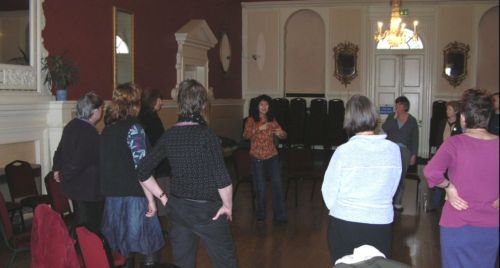Niggunim Singing Workshop at Stamford Arts Centre
Polina arrived by train to Peterborough at 1.15am on Saturday 1st March having been singing at a concert in Cologne, Germany, the day before. I always have at least one late night out at the weekend and so it was not a problem to collect Polina and have her stay at my house. She lives in Brighton, Sussex with her husband and they both perform regularly as well as teach. At the workshop, she explained about the history of Yiddish singing: how the Jewish communities all around the world have kept to this style of music. Some groups have added slightly different endings, but these are easily learnt because they remain within the basic framework of rhythms. We learnt a few songs, one of which was made up of the phonetic sounds ‘bai, bai, bai’ and another of ‘dai, dai dai.’ We learnt the ‘dai dai’ in a certain pitch and she showed us also how it could be sung in a higher octave above us, by demonstrating as we sang. She suggested we try different ‘endings’ when we were all singing together, which worked well. She encouraged us to speed up the sounds to make it exciting, with clapping hands and tapping feet. Then she slowed it down again. The songs could also vary from very quiet to loud!
Polina with workshop members
Polina taught us some intonation that sounded Jewish, such as ‘Yuh-uh’ or ‘Yi-iah.’
She described this as being two notes with a bridge between. The first sound is hard then after it is soft and goes down within the one syllabub. This is a very Jewish sound and is like an adornment, which is placed before a sound starting with a consonant, such as ‘yuh-uh dai dai’ or ‘yi-iah bai.’ These intonations would not necessarily be used all the time, but at certain places in the songs. Some songs have words, but most were like the ones we were learning. Songs are sung at family or community gatherings; one of our songs calls the angels to be present when celebrating a meal, its tempo was slower and sung with feeling.
Visit www.polinashepherd.co.uk



